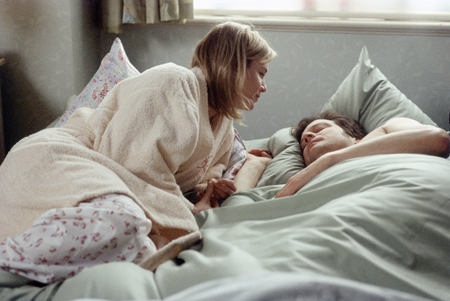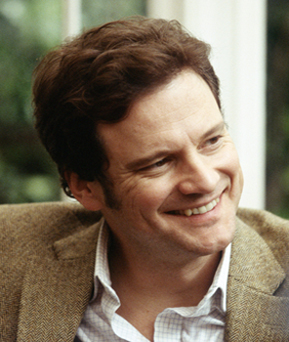Lust Actually: Bridget Jones's Men
Madelyn M. Ritrosky-Winslow
© 2004. Entertainment Magazine
 |
Bridget Jones (RENÉE ZELLWEGER) and a sleeping Mark Darcy (COLIN FIRTH) in a moment of romantic bliss. |
Colin
Firth… Hugh Grant… How is a girl to choose?
These two striking men are the rival lovers who come to blows over the
average-girl heroine in Bridget Jones's Diary (2001), and who do so
again in the highly anticipated, unusual romantic comedy sequel, Bridget
Jones: The Edge of Reason (opens in theaters November 19, 2004).
Oh, to be Bridget – or Renée Zellweger. When Mark Darcy (Firth)
fights Daniel Cleaver (Grant), savvy fans know it's Colin Firth beating
up Hugh Grant. In one corner of this British rom-com franchise we have
Grant as Daniel – sly, witty, teasing, and casually sexy, an engaging
flirt who can charm your skirt off. Hold on to your skirts for the
sequel.
|
COLIN FIRTH as Mark Darcy |
In the opposite corner we have
Firth as Mark – intense, committed, quietly droll, and profoundly
sexy, possessor of a disarming sincerity that's impossible to resist.
Who wants to resist? Firth's star image is exactly that of an
irresistible sexual magnet for women. |
Viewers get double the pleasure
with two equally attractive leading men – doubled yet again with the
sequel. These films and publicity consciously use star associations,
including past performances and established star images, to entice women
with sexy Hugh Grant and dashing Colin Firth. This is especially true of
Firth.
Helen Fielding, author of the original Bridget Jones newspaper columns
and books and one of the screenwriters, modeled Mark Darcy on Firth as
Mr. Darcy in Pride and Prejudice (1995). That popular BBC/A&E
miniseries launched Firth, as the romantic Jane Austen hero, into sex
symbol stardom.
Edge of Reason continues the blending of actor, image, and character to
give us Grant-as-devilish-Daniel and Firth-as-ideal-Mark. It's not just
that this is round two. It's that round one so thoroughly played on
their images, while their off-screen public personae and between-Bridget
characters tie in neatly.
|
Think of Grant's selfish,
scheming characters, redeemed at the end, in About a Boy (2002) and Two
Weeks Notice (2002). Think of his charming prime minister in Love
Actually (2003), which continues his Notting Hill (1999) and Four
Weddings and a Funeral (1994) sensitive screen persona. |
HUGH GRANT as Daniel Cleaver |
Grant was number six on People magazine's ten sexiest men list of 2003. Now, with wily bad-boy charm, Grant's Daniel takes Bridget to the edge of reason. Fans are divided, but some feel the badder the better with Grant.
Firth's characters are
essentially sensitive, wanted men. Think of The Importance of Being
Earnest (2002), What a Girl Wants (2003), Hope Springs (2003), Love
Actually, and Girl with a Pearl Earring (2003). But Mark Darcy is off
the charts: women I've talked with (and I've talked with quite a few in
my research) use descriptions like "delectable," "hot
beyond hot," and "still waters run deep."
What makes Mark so gosh-darn attractive? To fans, he is pretty much the
perfect man. Indeed, in the trailers and posters for Edge of Reason,
Mark is described as exactly this: a "flawless" and
"perfect boyfriend" (you know he will be by movie's end). Talk
about a highly desirable lover.
Firth's physical attributes (tall, dark, and handsome – killer smile,
eyes to match) and his image of off-screen integrity seal the deal. No
wonder he is at the top of British sexiest actor lists, has a burgeoning
fan base in the U.S., and has women proclaiming him "the sexiest
man alive." Listen up, People magazine.
The masculinity embodied by Hugh Grant in films like Sense and
Sensibility (1995), Notting Hill, and Love Actually and by Colin Firth
in films like Pride and Prejudice, Love Actually, and both Bridget Jones
films is of a specific variety.
|
(L to r) HUGH GRANT as Daniel Cleaver and RENÉE ZELLWEGER as Bridget Jones in a quiet, romantic moment. |
This kind of masculinity can be
intoxicating: an outrageously attractive man desires completely one
woman, promising unconditional love, sexual fulfillment, and fidelity. |
Hugh Grant and Colin Firth could be described as "women's
men," often overtly eroticized for a female audience – a
relatively rare representation of masculinity. Traditionally, women are
constructed on-screen as "to-be-looked-at," while men do most
of the looking. If men's bodies are "exhibited," films provide
excuses such as fighting.
Grant and Firth are not only often framed as to-be-looked-at by women in
their films and in the audience, but they are watched exactly this way.
This is not to say their characters don't gaze longingly at women they
love – they certainly do, with Firth as Mr. Darcy arguably setting the
contemporary standard for what is called a smoldering gaze of desire.
It's an intricate mesh of men looking and being looked at, the actors
making desire come alive for women in the audience.
British writer Dominic Wills says "few actors have ever burrowed as deeply into the national female psyche as Colin Firth. It seems that no British woman of child-bearing age can quite control herself when his name is mentioned." Mr. Darcy did this. So with Edge of Reason, where pre-release publicity and press coverage for this eagerly anticipated film point to Firth's sublime attractiveness, it's mind-boggling. But then we also have Hugh Grant, who may be at his best playing cads. Fight!


